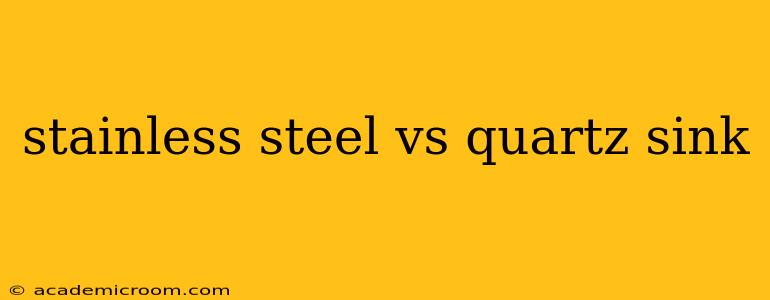Choosing the perfect kitchen sink can feel overwhelming, with a vast array of materials, styles, and features available. Two popular contenders often top the list: stainless steel and quartz composite sinks. Both offer distinct advantages and disadvantages, making the decision highly dependent on your individual needs and preferences. This comprehensive guide will delve into the key differences between stainless steel and quartz sinks, helping you make an informed choice for your kitchen.
What are the Pros and Cons of Stainless Steel Sinks?
Stainless steel sinks have long been a kitchen staple, prized for their durability and classic appeal.
Pros:
- Durability: Stainless steel is incredibly tough, resisting scratches, chips, and stains remarkably well. It can withstand heavy use and high temperatures without significant damage.
- Easy Cleaning: A simple wipe-down usually suffices to keep a stainless steel sink sparkling clean. Most spills and messes are easily removed.
- Heat Resistance: Stainless steel can tolerate extremely hot pots and pans without warping or discoloring.
- Affordability: Generally, stainless steel sinks are more budget-friendly than quartz composite sinks.
- Variety: Stainless steel sinks come in various styles, sizes, and finishes, offering flexibility to match any kitchen design.
Cons:
- Noise: Water running into a stainless steel sink can be quite noisy, especially if it's a thin gauge.
- Scratches: While durable, stainless steel can still be scratched, although these scratches are often less noticeable than on other materials.
- Show Water Spots: Depending on the water hardness in your area, you might notice water spots more readily on a stainless steel sink.
- Can Dent: Though resistant to many things, a heavy impact can dent a stainless steel sink.
What are the Pros and Cons of Quartz Sinks?
Quartz composite sinks, made from a blend of natural quartz and resin, offer a distinctly different aesthetic and set of characteristics.
Pros:
- Aesthetic Appeal: Quartz sinks boast a sleek, modern look, often featuring a seamless, integrated appearance. They come in a wide variety of colors and styles.
- Non-Porous Surface: The non-porous nature of quartz prevents bacteria and stains from penetrating the surface, making them exceptionally hygienic and easy to clean.
- Quiet Operation: Quartz sinks are significantly quieter than stainless steel, reducing noise when water runs.
- Heat Resistance: While not as heat-resistant as stainless steel, quality quartz sinks can generally withstand moderately hot temperatures.
- Variety of Colors and Styles: Unlike stainless steel's limited color palette, quartz sinks offer a vast array of colors and designs to complement any kitchen decor.
Cons:
- Cost: Quartz composite sinks are typically more expensive than stainless steel options.
- Susceptibility to Chips and Cracks: While durable, quartz sinks can chip or crack if subjected to heavy impacts or sharp objects.
- Repair Difficulty: Repairing a chipped or cracked quartz sink is often more challenging and expensive than repairing a stainless steel sink.
- Heat Sensitivity: Extreme heat can damage a quartz sink, so avoid placing extremely hot pans directly on the surface.
Which Sink Material is More Durable?
Both stainless steel and quartz composite sinks are durable, but in different ways. Stainless steel excels in resisting scratches and dents from everyday wear and tear, while quartz composite sinks are less prone to scratching but more susceptible to chipping or cracking from impacts. The "more durable" sink depends on the type of wear and tear your sink will likely experience.
Which Sink is Easier to Clean?
Both materials are relatively easy to clean. Stainless steel requires a simple wipe-down, while quartz's non-porous surface prevents staining and bacterial growth, making cleaning a breeze. Ultimately, cleaning ease is comparable for both.
Which Sink Material is Better for a Busy Family?
For a busy family, both options have merits. Stainless steel’s durability and ease of cleaning are advantageous. Quartz’s non-porous surface and resistance to stains are also great for high-traffic kitchens. The best choice comes down to personal preference in terms of style and budget.
Which Sink is More Resistant to Stains?
Quartz composite sinks are significantly more stain-resistant than stainless steel due to their non-porous surface. Stains are easily wiped away from a quartz sink, whereas stainless steel might require a bit more effort to remove stubborn stains.
Which Sink is Quieter?
Quartz composite sinks are undeniably quieter than stainless steel sinks when water runs. The sound-dampening properties of the quartz material significantly reduce noise.
Which is More Expensive, Stainless Steel or Quartz?
Quartz composite sinks are generally more expensive than stainless steel sinks. The price difference can vary depending on the size, style, and brand.
Ultimately, the best sink for your kitchen depends on your priorities, budget, and style preferences. Carefully weigh the pros and cons of each material to make the best decision for your home.
